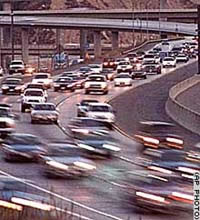Britain's motor industry risks being fined heavily after admitting that all car manufacturers may have colluded to share sensitive British sales data for more than 20 years, a newspaper reported last Sunday.
Lawyers for the Society of Motor Manufacturers and Traders (SMMT), the British motor industry's trade association, last week ordered the practice of sharing sales data to end immediately, The Sunday Telegraph said.
Lawyers believe such acts could be in contravention of British and European competition laws set up to combat cartels, risking heavy fines for both the society and manufacturers.
"We are adopting a cautious approach until we have done the assessment as to whether we are complying with the law," SMMT head of policy Paul Everitt said.
The society fears that if the sharing of predicted sales figures is illegal, it could be linked to the historical price inequality between prices for cars in Britain and the rest of Europe, the paper said.
This could leave the industry open to compensation claims from every person who bought a car during the past two decades.
The past decade has seen numerous British inquiries into manufacturers' habit of fixing prices for new cars by allowing only tightly controlled franchised dealers to sell their vehicles, The Sunday Telegraph said.
Five years ago, a British competition commission report judged that this practice -- known as selective and exclusive dealerships -- meant that British car buyers were paying a 10-percent premium over the price paid by their European counterparts, it added.
"If they (the manufacturers) were sharing information that was not in the public domain, that would be indicative of anti-competitive practice," Elaine Kellmann, an independent lawyer who specialises in competition law at London-based solicitors Fox Williams, told the weekly.
A spokesman for Britain's Office of Fair Trading said the crucial issue was "whether or not the parties could use the information they receive in a way that affects competition between themselves".
He added that the office had the power to fine guilty companies up to 10 percent of their annual turnover.




 By: N. Peter Kramer
By: N. Peter Kramer
